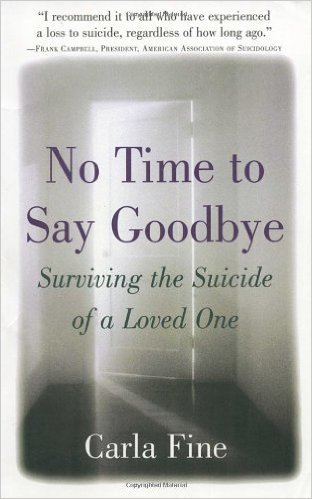Elder Suicide - the risks and what we can do to help our loved ones
Cheryl Ronzoni of the American Foundation for Suicide Prevention writes here about elder suicide, which occurs more frequently than we might think. She explains what are the risks factors, the signs for which we need to be on the look out and how to support our elderly relatives.
Suicide has received considerable media attention in recent years, as cases involving teen bullying and celebrity suicides such as Robin Williams have generated a great deal of public interest and alarm. Suicide statistics for teens, young adults and middle-aged men are sobering, but there is a group of individuals which seems to fall under our radar more frequently - elders. A 2014 Washington Post article highlighted the rising rates of suicide among the elderly population, noting that white men over 85 are taking their own lives at four times the national rate. As the children, grandchildren or spouse of an elderly loved one, what do you look for? How can you help?
Knowing the Risks about Elder Suicide
According to the Centers for Disease Control (C.D.C.) in the United States, suicide rates for males are highest among those aged 75 and older (rate 36 per 100,000). As the child or grandchild of a widower father or grandfather in poor health, you want to be aware of the risk factors if you have the slightest concern about your elderly loved one. The website Caring.com, which features information and resources about elder care and health, lists the following as risk factors of elder suicide:
• Discussing or reading about suicide and death
• Talking about feeling hopeless/ making suicidal threats
• Neglecting to follow medical advice
• Stockpiling medications
• More frequent use of alcohol or prescription medication
• Giving items away/making statements of good-bye to friends or family
• Sleeping too often or not sleeping enough
• Isolating from family and friends
• Developing a sudden interest in firearms
• Making sudden changes or revisions to a will

If your loved one is in declining health, faces increased isolation
and/or has suffered the loss of a close relative - particularly a spouse
- it is imperative to be aware of these warning signs.
Couple Suicide/Murder-Suicide
A shocking but increasing statistic in elder suicide is couple suicide, or murder-suicide. Elder murder-suicide is typically the act of a depressed, controlling husband taking the life of his ill wife, then himself. According to a Professor of Psychiatry and Behavioral Sciences at the University of South Florida, the murder-suicide rate among couples 55 and older in Florida has increased ten times since 1988. It is believed these numbers are reflective of statistics across the United States.
Elderly wives who are killed during homicide-suicide typically are murdered without their consent, often in their sleep. The husband's depression and the couple's isolation from friends and family often proceed the homicidal and suicidal act. According to the website WebMD, other risk factors include:
- The husband may have a dominant or controlling personality over the course of a lengthy marriage.
- One or both may have medical problems or the health status of one spouse has changed. This may include a wife who has Alzheimer's disease or a similar condition and the husband is the caregiver.
- Relocation to a nursing home or assisted living facility is being discussed or has been decided upon.
- The couple is withdrawing and isolating from friends, family and social activities.
- They may be arguing or even discussing separation or divorce.
If you suspect your loved ones are at risk for suicide or murder-suicide, you have several options. It is advisable to call a suicide crisis or hotline center, the family physician, a psychiatric or medical emergency room or a community mental health center. (See the resources section below). If there is a gun in the house or other dangerous weapons, remove them immediately. Even if you see signs but your loved one tells you he isn't contemplating such a drastic act, it is always best to err on the side of caution.
Suicide and Grieving
When an elderly loved one has lost a close family member, particularly a spouse, this can cause significant isolation and depression. If a spouse loses a partner after many years of married life together, one may not know how to function day-to-day without the other. Suicide may enter into the equation, as the thought of life without the spouse may become unimaginable. Suicidal ideation may even be indirect; neglecting medication or foregoing seeking medical attention for health problems in hopes that death will reunite them with the loved one they miss.
If your family has suffered the loss of a parent or grandparent and the other spouse is still living, be aware of depression, isolation and/or a noticeable decline in health. Make efforts to check in regularly or share the responsibility of checking in with other family members. Involve your grieving loved one in regular activities such as family dinners, church services, social gatherings and children's events, such as sports or recitals. Encourage friends to call or stop by and offer invitations to join in senior activities. Offer to make doctor appointments and accompany them whenever possible.
Can I Make a Difference in Elder Suicide?
The answer is yes...with awareness and proactive steps. Keep in regular touch with your elderly loved one and visit as much as possible. Remember that our elders are part of generations that do not readily confide their feelings out loud; they may not be as comfortable sharing feelings or seeking help for mental health issues. While seeking help seems like the logical thing to do from our perspective, it may not be for them.
Do not hesitate to contact a suicide hotline or crisis center (as already mentioned) on their behalf if you have concerns your loved one may take his or her life. With love, awareness and resourcefulness, you can take steps to prevent the loss of a beloved parent, grandparent, uncle or friend you truly do not want to live without.
Cheryl Ronzoni sits on the Springfield Walk Committee for the Western MA Chapter of the American Foundation for Suicide Prevention.

Suicide Prevention Resources
The American Foundation for Suicide Prevention offers information, a crisis line and support groups across the country. www.afsp.org
The International Association for Suicide Prevention provides worldwide information and crisis centers across the globe. www.iasp.info
Recommended Read:
No Time to Say Goodbye by Carla Fine
Related Pages:
- Grief and Sympathy Home
- Coping with Suicide
- Elder Suicide
Where to get help:
Have You Considered One-on-One Online Grief Counseling?
Get Expert and Effective Help in the Comfort of Your Own Home
The following information about online counseling is sponsored by 'Betterhelp' but all the opinions are our own. To be upfront, we do receive a commission when you sign up with 'Betterhelp', but we have total faith in their expertise and would never recommend something we didn't completely approve.
Do you feel alone and sad with no support and no idea how to move forward? It can be tough when you are stuck in grief to find the motivation to get the most out of your precious life.
Online counseling can help by giving you that support so you don't feel so alone. You can have someone to talk to anytime you like, a kind and understanding person who will help you to find meaning in life again, to treasure the memories of your loved one without being overwhelmed and to enjoy your activities, family and friends again.
- Simply fill out the online questionnaire and you will be assigned the expert grief counselor most suitable for you. It only takes a few minutes and you don't even have to use your name.
- Pay an affordable FLAT FEE FOR UNLIMITED SESSIONS.
- Contact your counselor whenever you like by chat, messaging, video or phone.
- You can change counselor at any time if you wish.
- Click here to find out more and get started immediately.
- Or read more about how online counseling works here.
Sales from our pages result in a small commission to us which helps us to continue our work supporting the grieving.
Hypnosis for Grief - 10 Ways It Can Help You
Try a gentle hypnotherapy track to relax the mind. Learn how self-hypnosis can help you cope with grief at any time of the day or night.

For Remembrance:
Sales from our pages result in a small commission to us which helps us to continue our work supporting the grieving.
Memorial Jewelry to Honour a Loved One
Check out our lovely range of memorial jewelry for any lost loved one. Pendants, necklaces, rings or bracelets, we have them all in all kinds of styles. Choose for yourself or buy as a sympathy gift.
Create an Online Memorial Website
Honour your loved one with their own memorial website. Share photos, videos, memories and more with your family and friends in a permanent online website. Free for basic plan with no ads.









